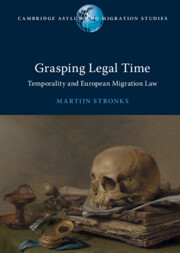'A timely challenge to the focus on the here and now of most legal analyses, in light of cultural studies on the lived experience of individual migrants.'
Daniel Thym - Chair of Public, European, and International Law, University of Konstanz
'This is an exciting book at the intersection of philosophy and migration law. It critically and carefully analyzes the role of time in the control and exclusion of migrants, and makes a strong case for jus temporis and the normative value of human time to improve the life of migrants.'
Nanda Oudejans - Faculty of Law, University of Amsterdam
'We tend to think of migration law as regulating a relation between people and space, but Martijn Stronks elegantly demonstrates the role of diverse conceptions of time as mediators of that relationship. Stronks compellingly argues that we must account for the normative demands of ‘human time’ in the exercise of temporal governance over non-citizens.'
Audrey Macklin - Professor & Rebecca Cook Chair in Human Rights Law, University of Toronto
'Grasping Legal Time is an exceptional exploration of the relationship between the complex techniques of legal time and the lived temporal experiences of those subject to it. Through close analysis of European migration law, Martijn Stronks provides new insight into legal temporal manipulability and the impact on migrants’ ‘human time.’'
Melanie Griffiths - Birmingham Fellow, School of Geography, Earth and Environmental Sciences, University of Birmingham
'Clocks and calendars rule our lives, often so invisibly that we don’t recognize legal time or the ways it conflicts with the human experience of time. In Grasping Legal Time, Martijn Stronks brilliantly excavates the concept of legal time, offering a set of new conceptual distinctions to help scholars parse time’s place in law. This book is richly informed by scholarship across fields, and insightful and thoughtful in its conclusions. It is urgently important reading for anyone studying migration and how law operates for and upon all political subjects.'
Elizabeth Cohen - Professor of Political Science, Syracuse University
'Through illuminating legal examples, Stronks brings to life key concepts from the philosophy of time and makes a compelling argument for the value of human time as grounds for political inclusion. Essential reading for those of us coming to grips with the deployment of time as both a tool of migration governance and a strategy for critical praxis.'
Anne McNevin - Associate Professor of Politics at the New School for Social Research
‘One of the goals of the book is to highlight the importance of human time which is often neglected in migration law. And this is one of the book’s greatest successes, as it manages to bring to the surface the struggle of many, sometimes "invisible" persons who endeavour for many years to legalise their presence in the territory of the country they reside, or even the stories of those who, although they live lawfully somewhere, continue to live with the constant fear of removal. The author has thus made a welcome attempt to try and go beyond the use of clock and legal time that is typically used by legislation to regulate presence within territory and give some normative value to the lapse of someone’s time within a territory, which is the human time. I would strongly recommend to immigration lawyers, policy makers, and academics reading this book.’
Vasiliki Apatzidou
Source: European Law Review 2023, 48 (1), 144–146





